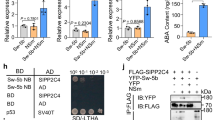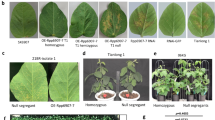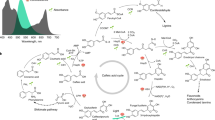Abstract
Barber and Paton1,2 concluded from grafting experiments between genetically early and late varieties of garden peas (Pisum sativum) that the dominant Sn gene causing late flowering is responsible for the production of a substance delaying flowering. This inhibitor passes into the plumule from the cotyledons over a period of 10–14 days after germination. Cuttings taken soon after germination usually flower at a lower node than those taken later, or than whole plants. This effect is most marked in short-days, since the delay in flowering produced by the Sn gene is the greater the shorter the photoperiod (Barber and Sprent, unpublished work).
This is a preview of subscription content, access via your institution
Access options
Subscribe to this journal
Receive 51 print issues and online access
$199.00 per year
only $3.90 per issue
Buy this article
- Purchase on Springer Link
- Instant access to full article PDF
Prices may be subject to local taxes which are calculated during checkout
Similar content being viewed by others
References
Barber, H. N., and Paton, D. M., Nature, 169, 592 (1952).
Paton, D. M., and Barber, H. N., Austral. J. Biol. Sci., 8, 231 (1955).
Author information
Authors and Affiliations
Rights and permissions
About this article
Cite this article
SPRENT, J., BARBER, H. Leaching of a Flower Inhibitor from Late Varieties of Peas. Nature 180, 200–201 (1957). https://doi.org/10.1038/180200a0
Issue Date:
DOI: https://doi.org/10.1038/180200a0
This article is cited by
-
Cytogenetics of the vegetable crops
The Botanical Review (1962)
-
Physiological genetics of Pisum II.
Heredity (1959)
Comments
By submitting a comment you agree to abide by our Terms and Community Guidelines. If you find something abusive or that does not comply with our terms or guidelines please flag it as inappropriate.



